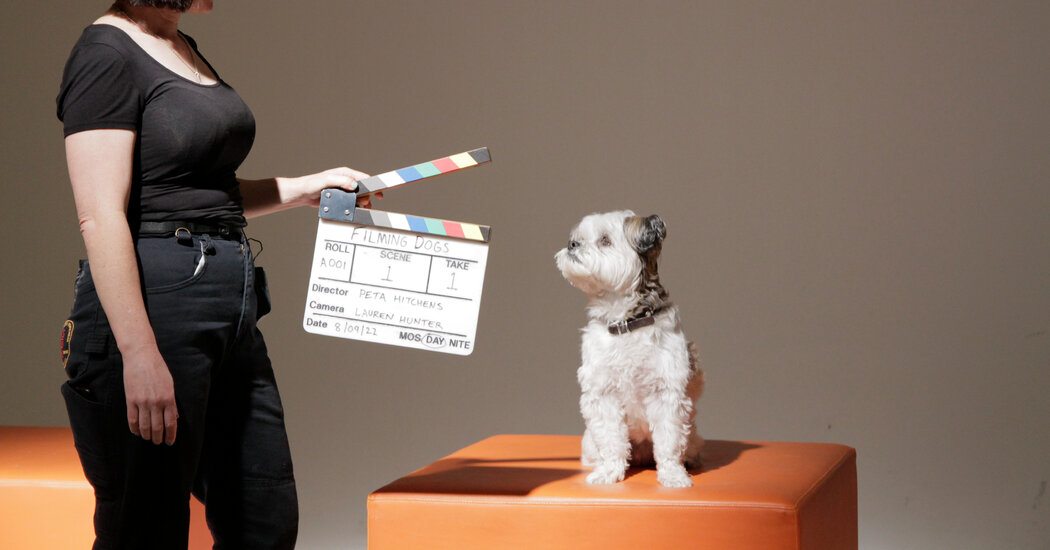The cinematic events debuting at the Village East by Angelika this weekend won’t feature any of the acclaimed actors from the recently concluded New York Film Festival. Some of the major figures in these movies have been known to jump on their directors, fall asleep on the job, drool on camera and chew the scenery (in every sense).
But that’s no surprise: They’re among the four-legged performers in the sixth annual NY Cat Film Festival and the eighth annual NY Dog Film Festival. Each offers short documentary and fictional works illustrating how people affect the lives of animals, and how animals affect the lives of people — usually in positive ways.
“I try to keep them to films that are lighter and that simply uplift you,” Tracie Hotchner, the founder of both festivals, said in a video interview. And even though some of the featured dogs and cats are in difficult circumstances, the movies, she added, are “more of a celebration of the groups that rescue them.”
These grass-roots film programs also benefit their subjects: Of the $18 all-inclusive ticket price for each festival, 10 percent goes to a pet-adoption nonprofit. (The Manhattan screenings will help support Muddy Paws Rescue and Meow Parlour Cats.) And fans who can’t see the programs this weekend may be able to catch them in the coming months when they tour to independent cinemas nationwide and in Canada.
“These are not, you know, Hollywood-style movies,” said Hotchner, an author, radio host and podcaster based in Vermont. They’re “like the poetry of films.”
Some are clearly light verse. The 102-minute feline festival, at noon on Saturday, includes “The Cat Duet,” by Lorelei De Armas and Julian Wood, 12-year-olds from Detroit who filmed themselves singing “Duetto buffo di due gatti,” a comic song often attributed to Rossini. (The only lyric is “Meow.”) The 110-minute dog festival, at noon on Sunday, features Nepal Arslan’s “47 Seconds,” his haiku-like response to discovering decades-old footage of a couple with a dog eerily resembling his own.
“Silent Paws,” by the global initiative Mutual Rescue, even incorporates a real poem: a work of the same title by Gabriel Spera, which scrolls by during an elegy to lost feline companions.
Neither festival, however, has a shortage of serious documentaries. Michelle Williams’s “Bear the Courthouse Canine” explores the pivotal role that a gentle Labrador retriever plays for the Contra Costa County, Calif., district attorney. Trained to lie under the witness stand during trials, Bear comforts traumatized victims who are testifying, especially children.
The dogs in “BARC if You Need Help” work on the other side of the criminal justice system. Produced by the Latham Foundation for the Promotion of Humane Education, this film examines Building Adolescent Responsibility and Compassion, a program in Michigan that recruits juvenile offenders to train animals — frequently pit bulls that have troubled histories, too.
“It’s like a mirror for them,” Tula Asselanis, the documentary’s director, said of the teenage participants. And the film suggests that “redemption is a powerful possibility, just through using the human-animal bond.”
But what struck Hotchner most about the festivals’ submissions this year was how much they tried to capture the inner lives of animals.
With cats, “it’s like, you know, ‘E.T.,’” she said. “So this alien comes into your life, and they’re so beautiful and so lovely. But what makes them tick?”
The filmmakers’ speculations are often comic, as in “Insomnia,” by Kim Best, who provides subtitles detailing a cat’s ruminations on this most unlikely of feline problems: “Embarrassingly, I considered sleeping with a dog.”
Other films that venture inside the minds of their subjects include Ned Thanhouser’s docudrama “Ranger: Canine Alpinist,” which relies on voice-over to relate the perspective of a dog who assisted human climbers on Mount Hood in Oregon almost a century ago. In the fictional “Set Adrift,” the British director Jennifer Sheridan uses only her furry actor’s expressiveness to convey a dog’s grief. Peta Hitchens’s Australian documentary “Filming Dogs” investigates a psychological question: Do pets like her own really enjoy performing for movies and television?
Intriguingly, Juhi Sharma’s comedy “Purrrfect Intervention” features no animals — until the credits. Kisha Peart, who produced and wrote it, stars as a New Yorker so cat-obsessed that her friends arrange treatment for her.
“Obviously, I’m a cat lady,” Peart said, adding that she turned her own pet’s camera shyness into a visual joke. Her character, she said, is “this crazy cat lady, but where are her cats?”
Live animals won’t attend the screenings, either, but they will be at parties on the eve of each festival. These celebrations, which require separate tickets, will feature mingling with the filmmakers and authors of books about pets. One of Hotchner’s contacts even arranged for a visiting celebrity at the pooch festivities: Bastian the Talking Terrier, whose YouTube channel has almost two million subscribers.
“I don’t know any famous dogs,” said Hotchner, who owns two Weimaraners. “But he said yes.”
NY Cat Film Festival
Saturday at the Village East by Angelika, Manhattan; catfilmfestival.com.
NY Dog Film Festival
Sunday at the Village East by Angelika, Manhattan; dogfilmfestival.com.


